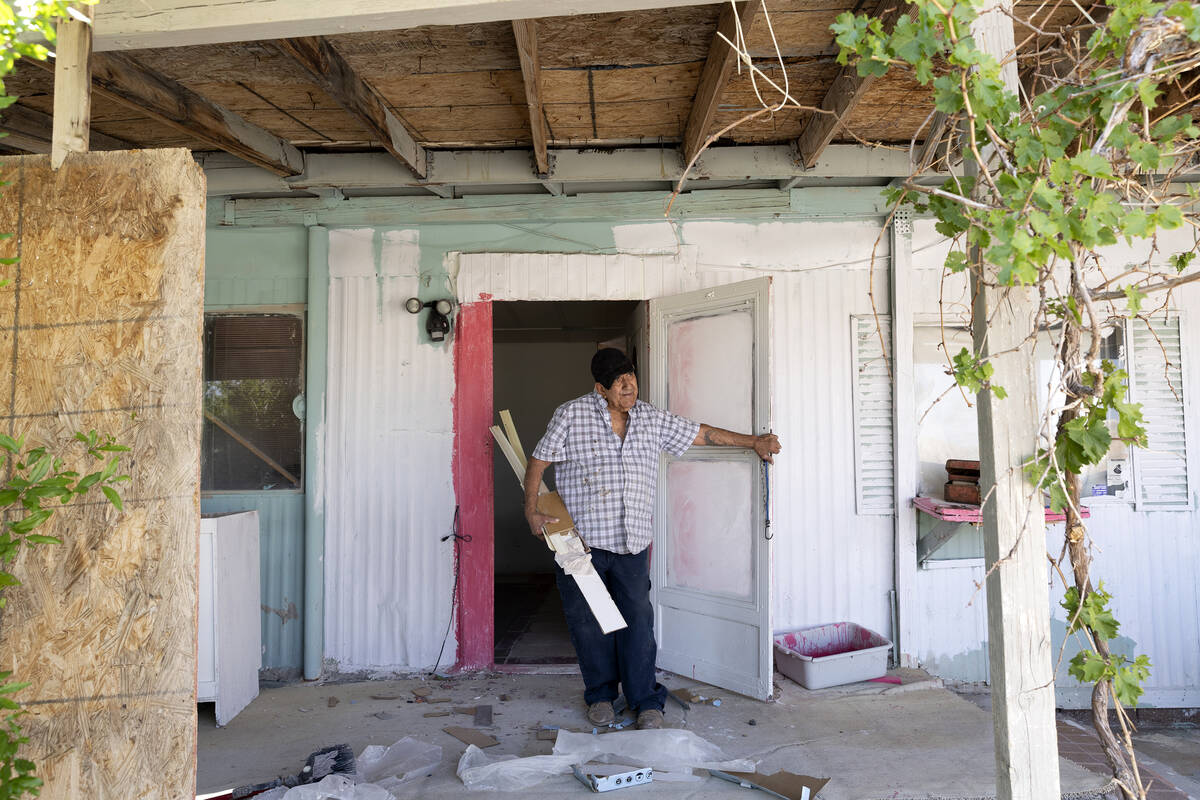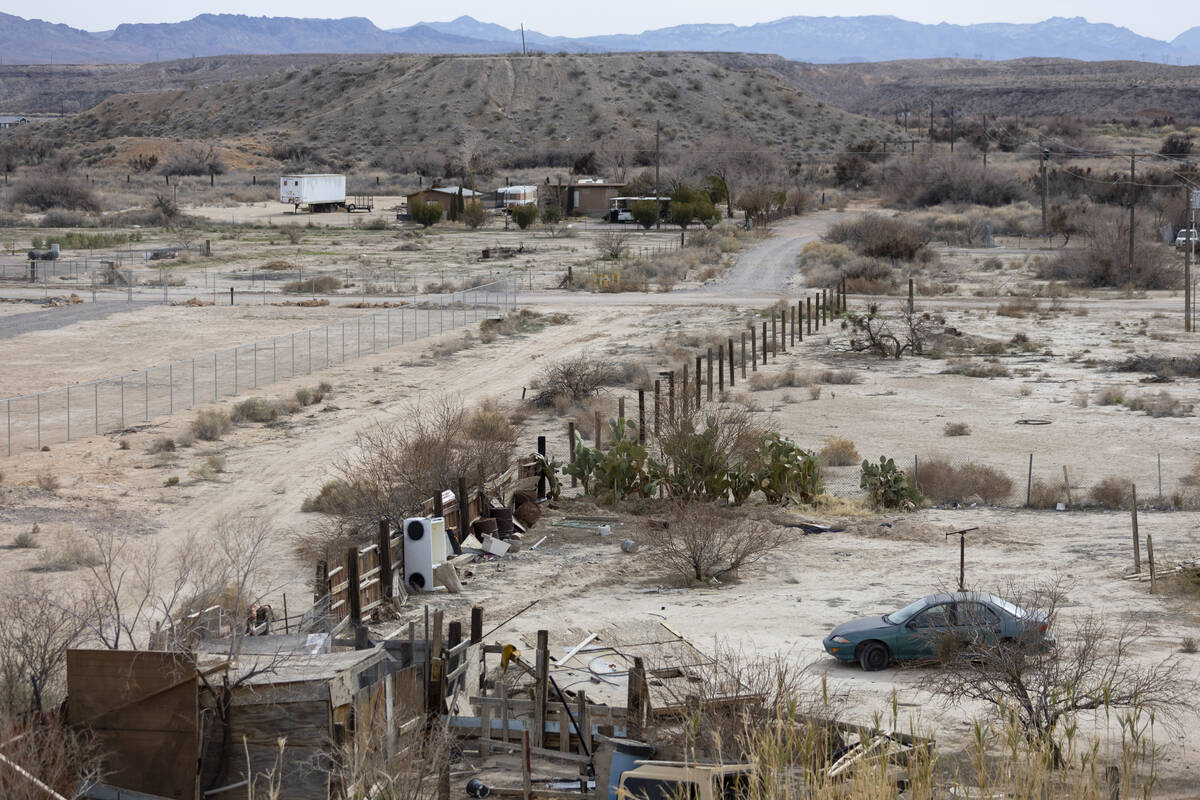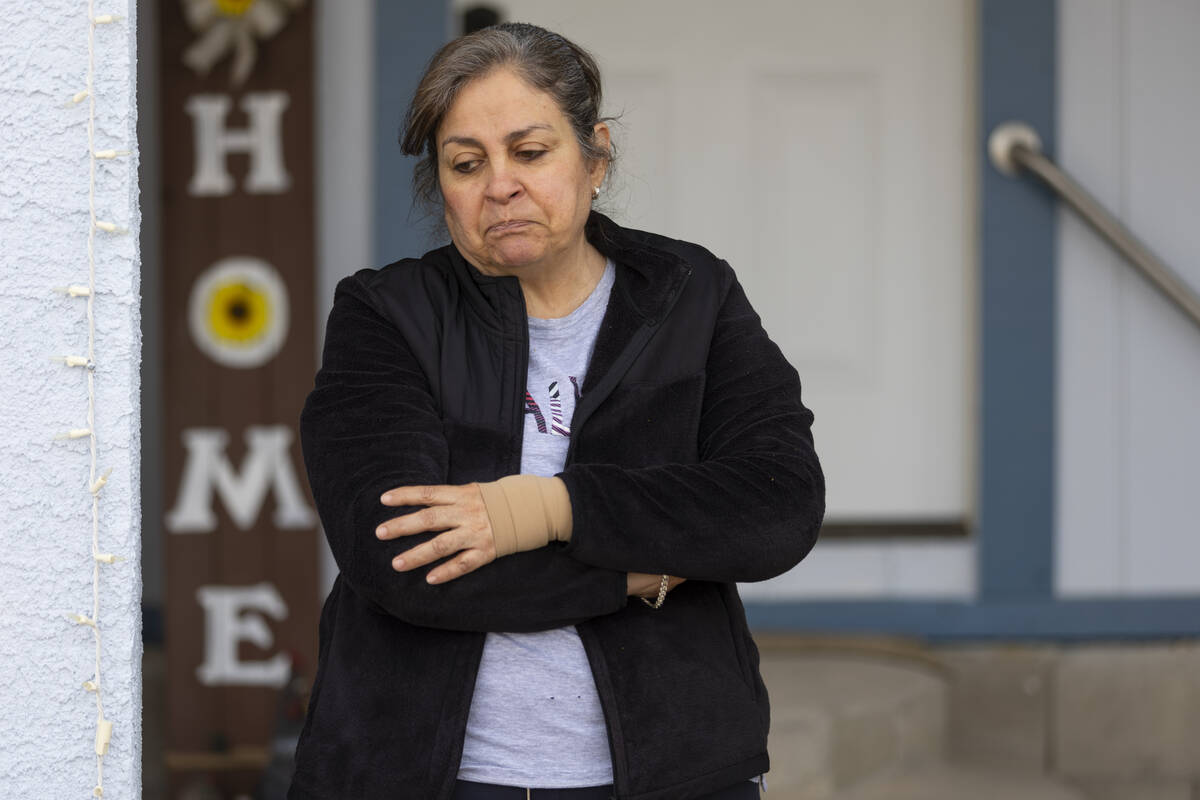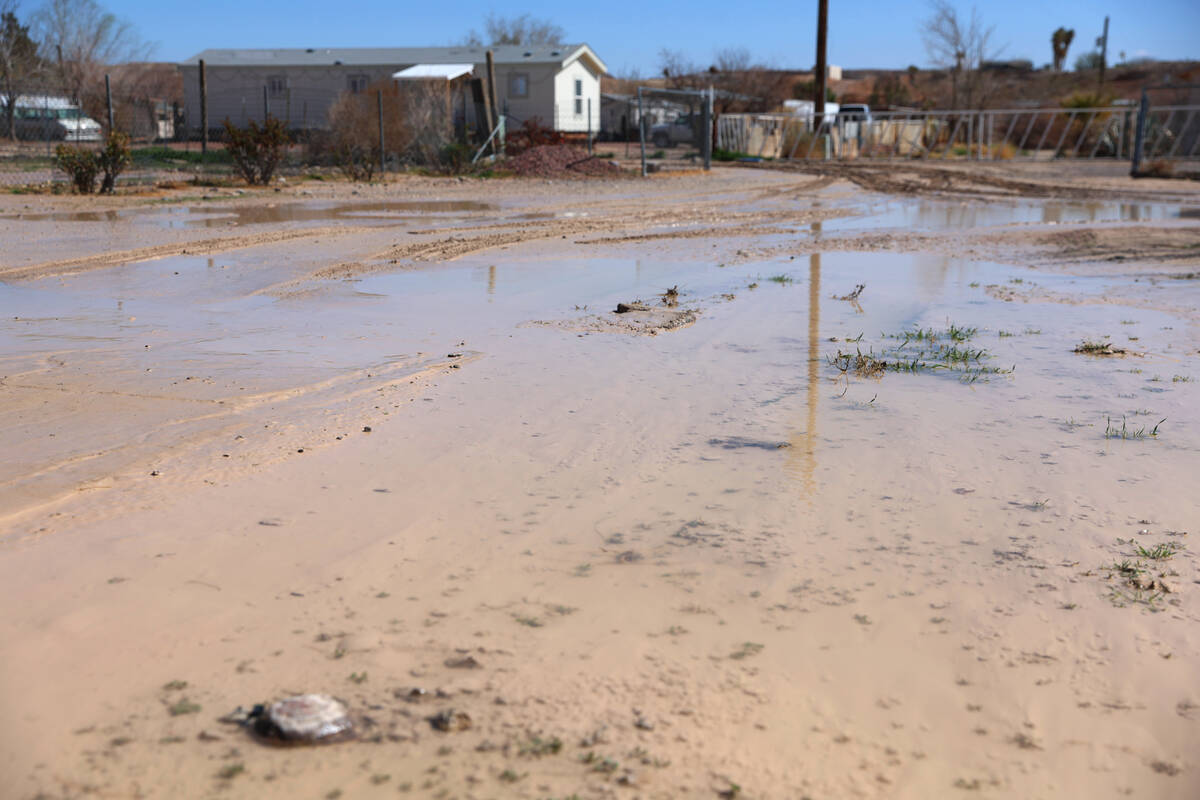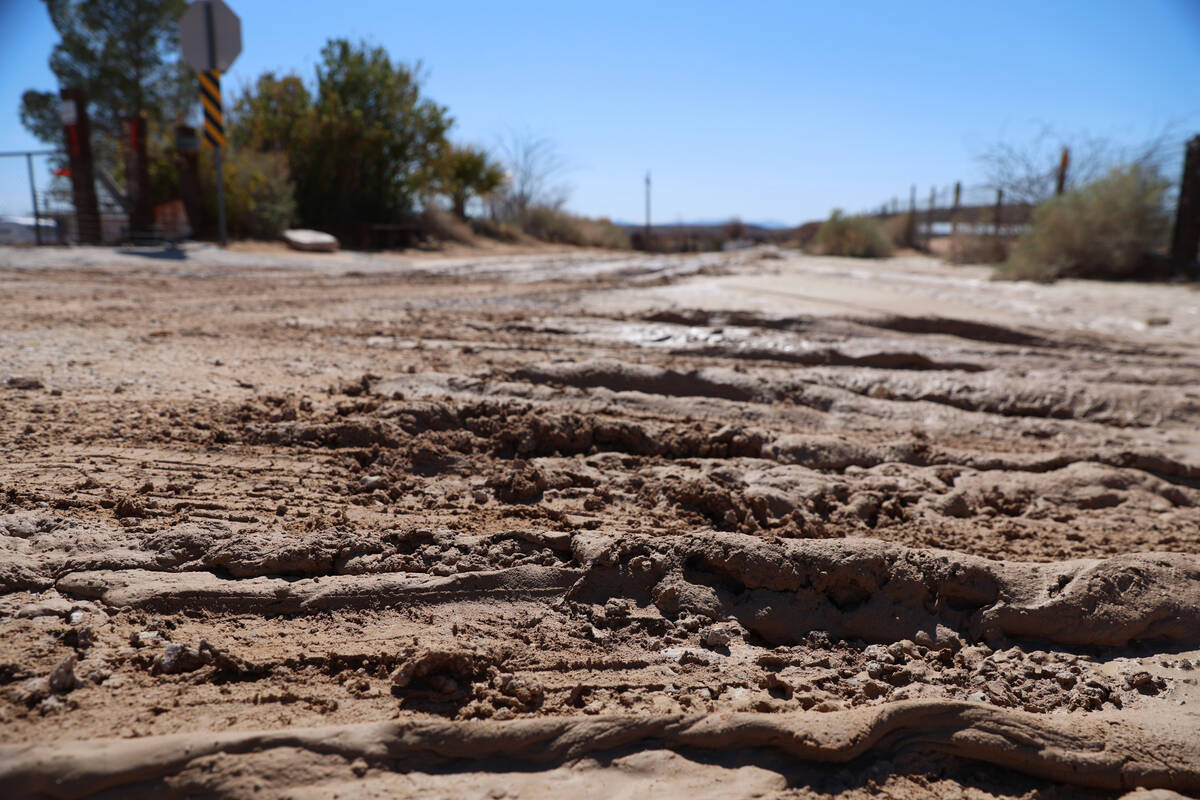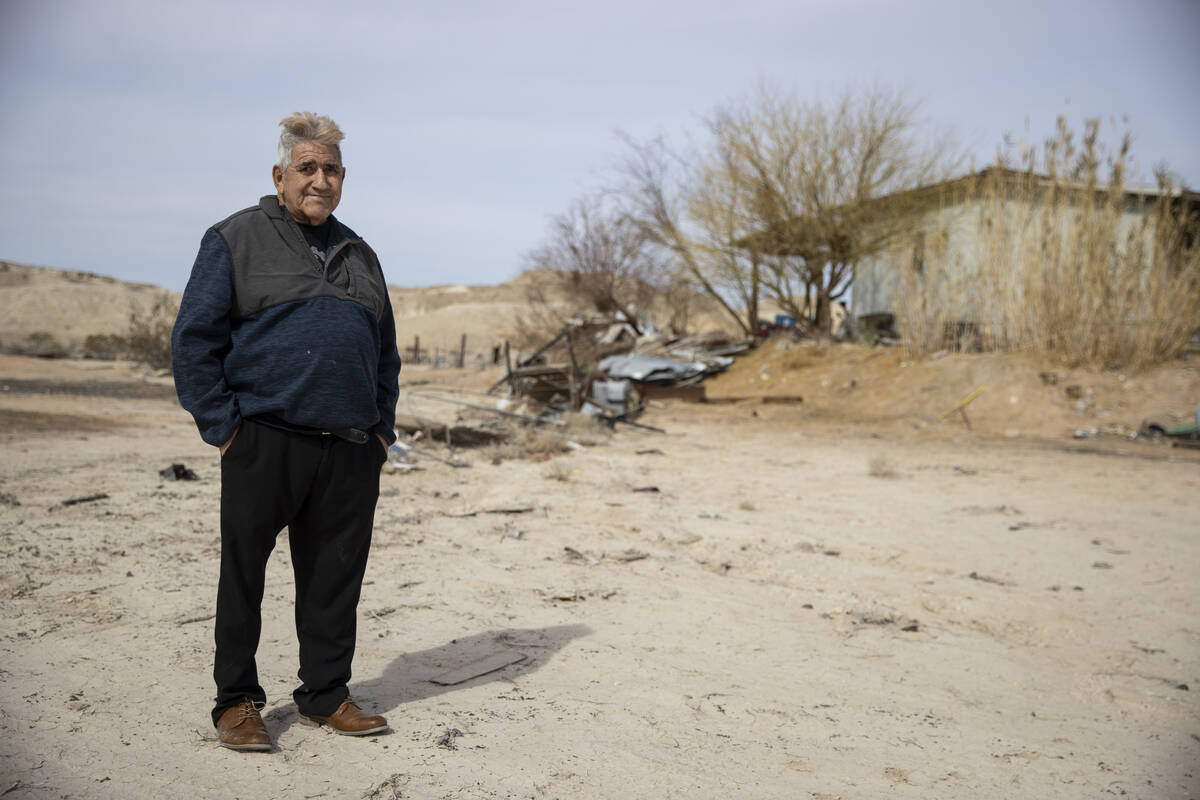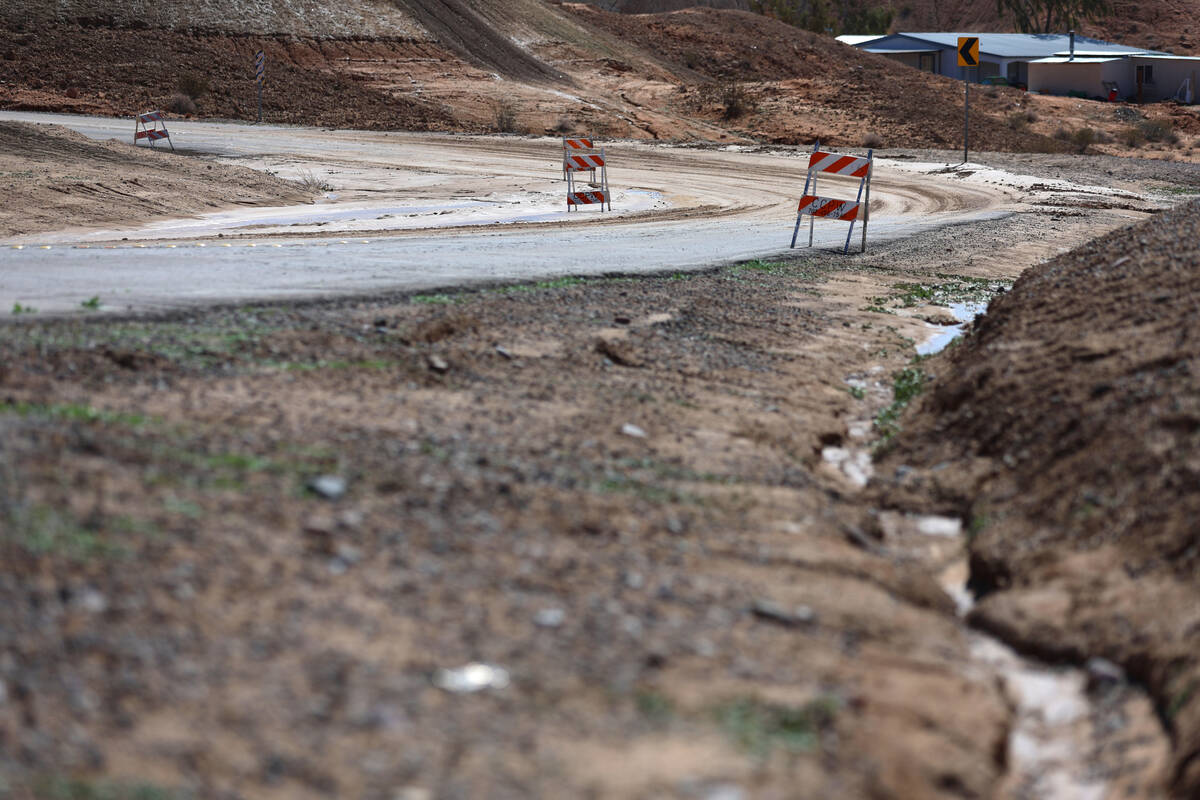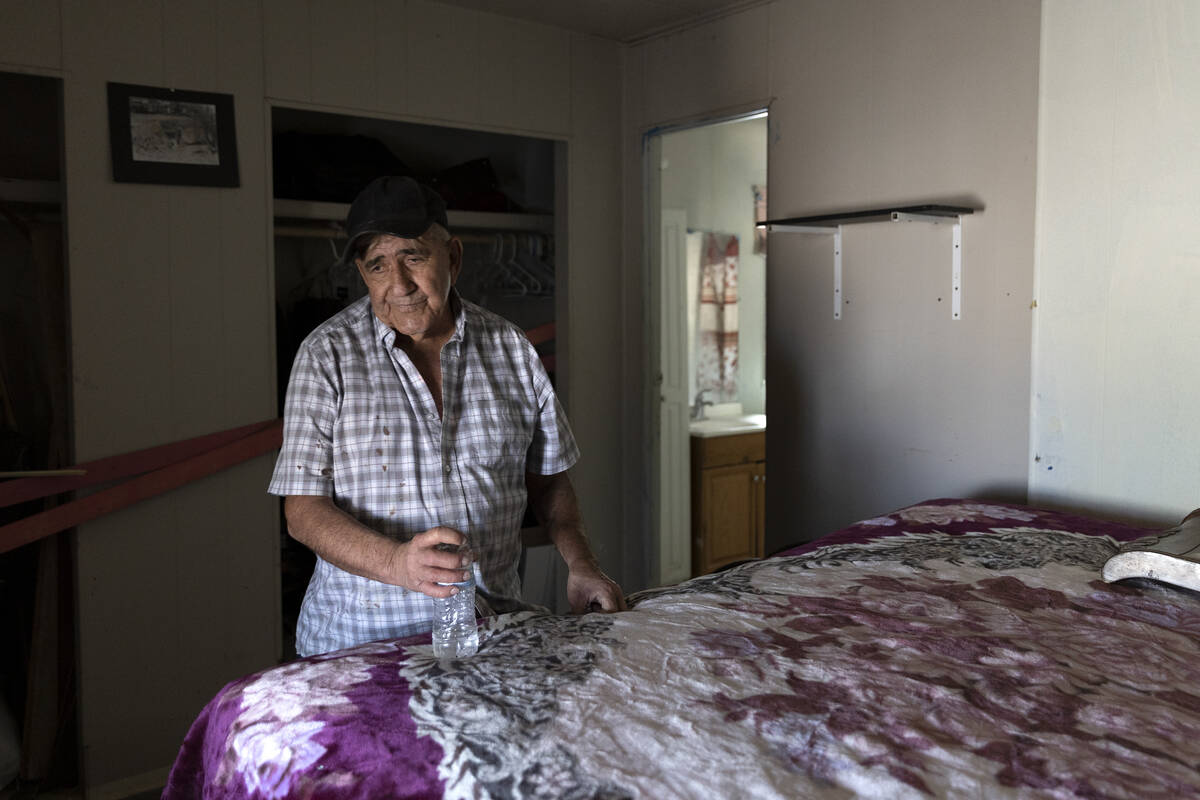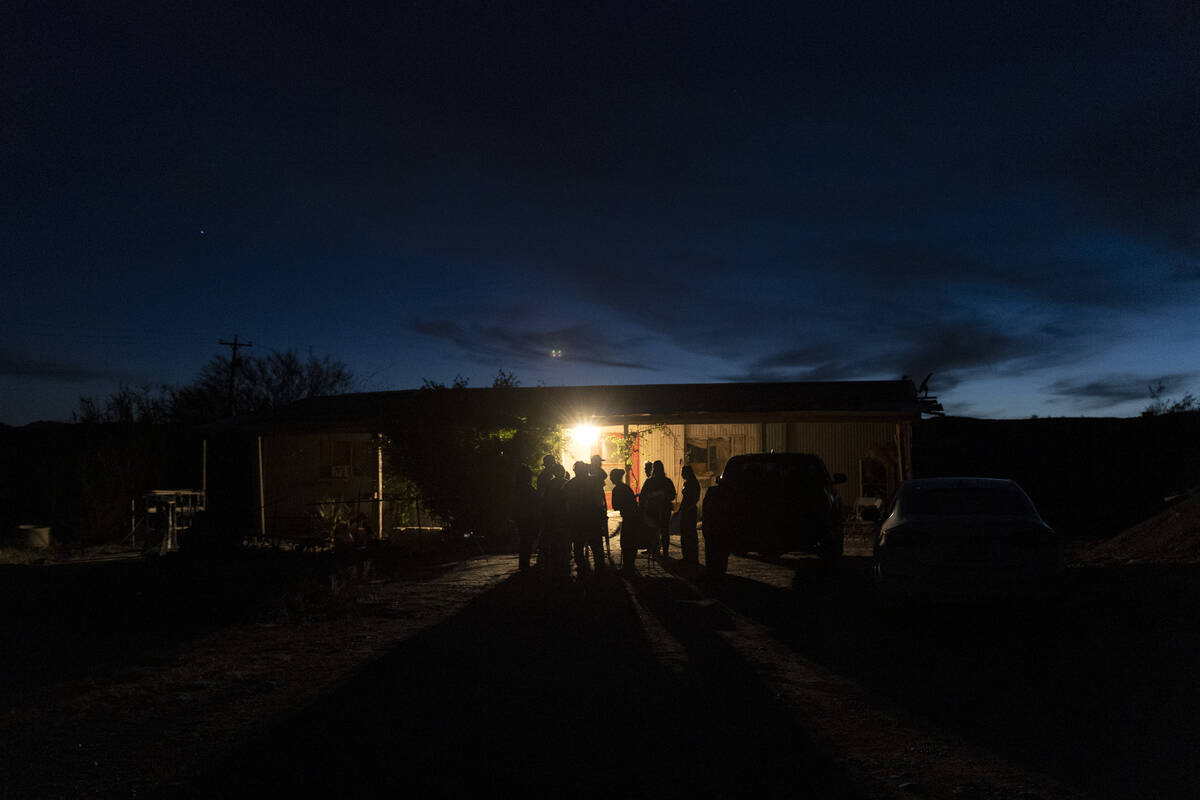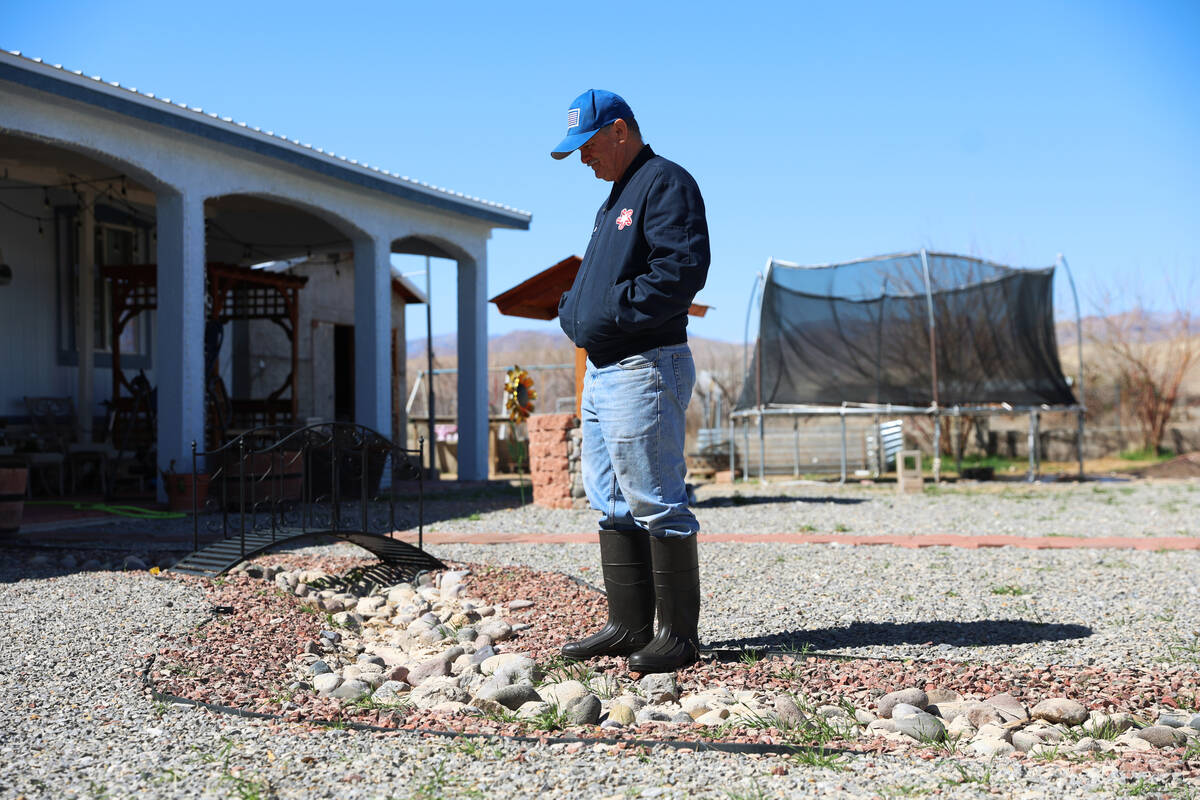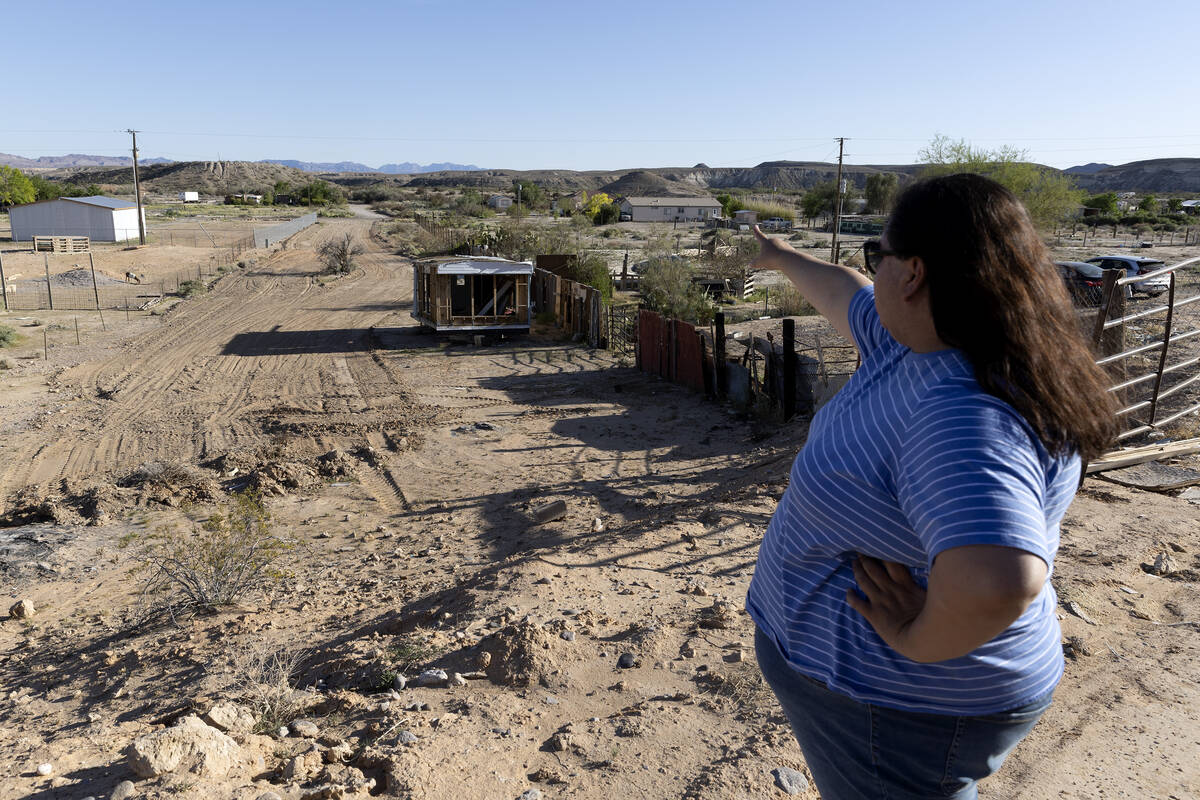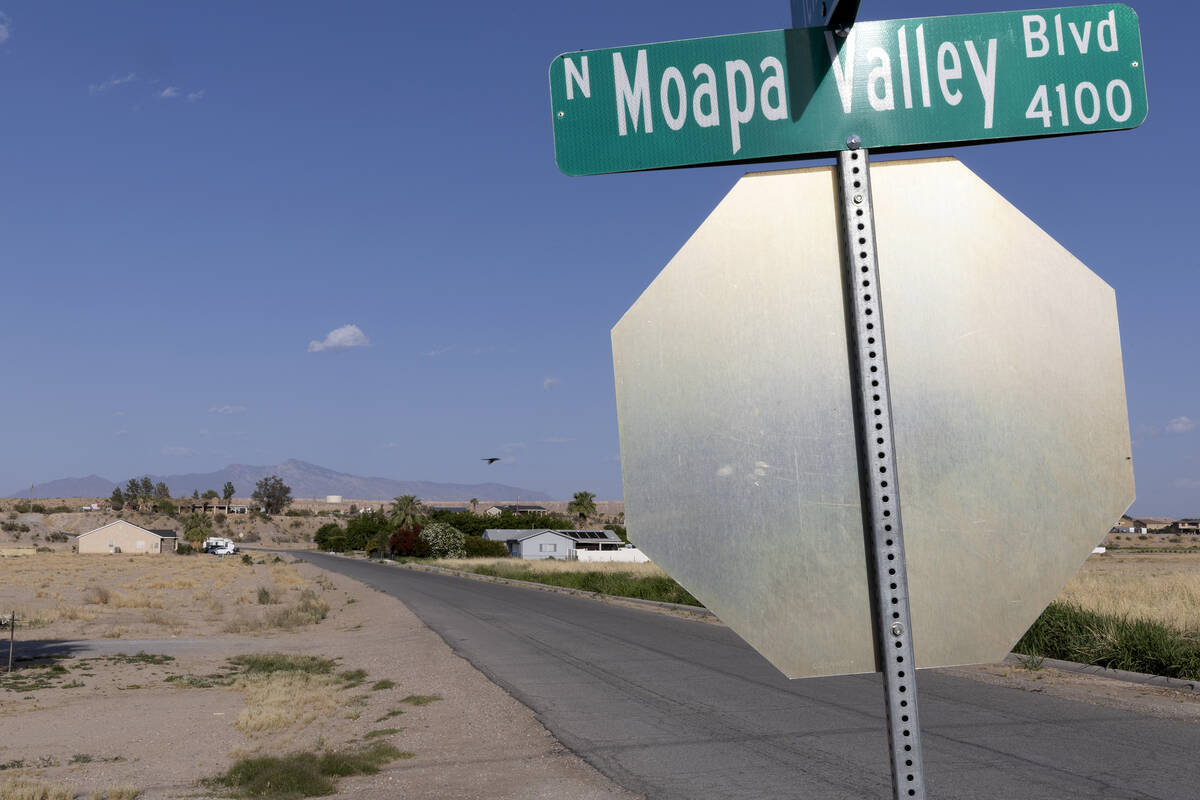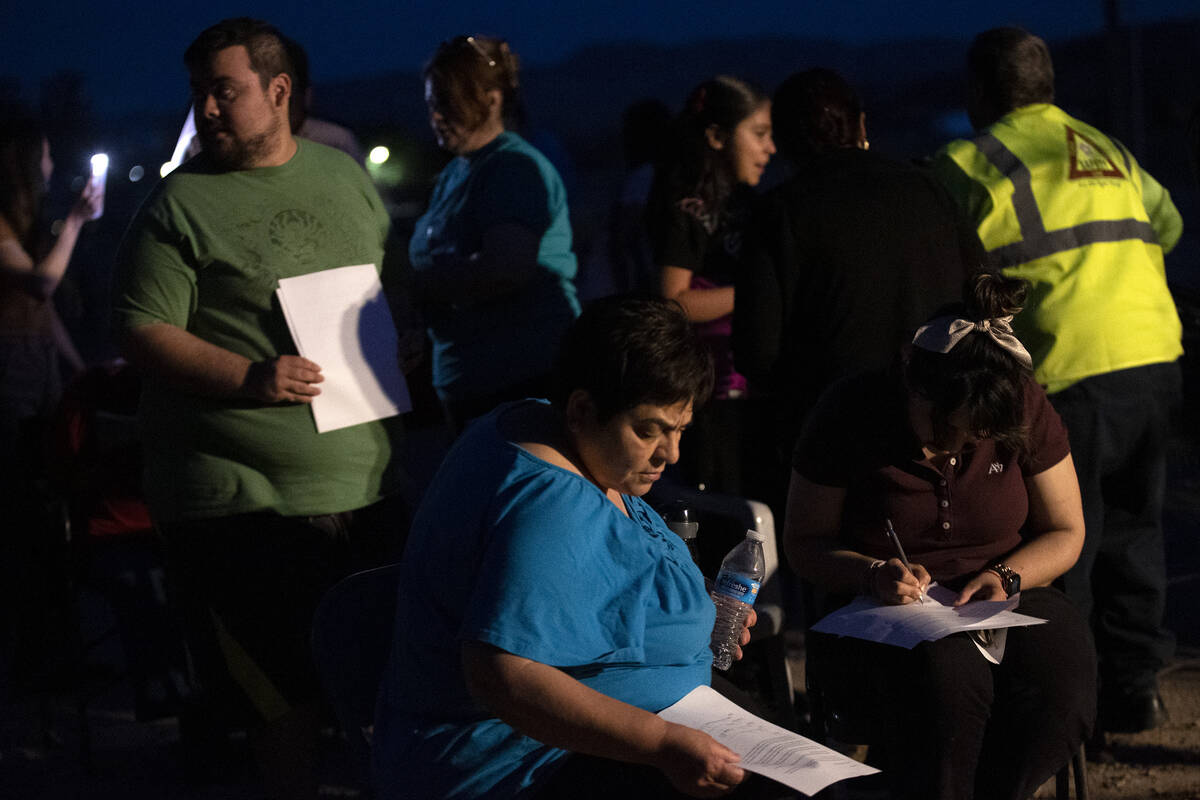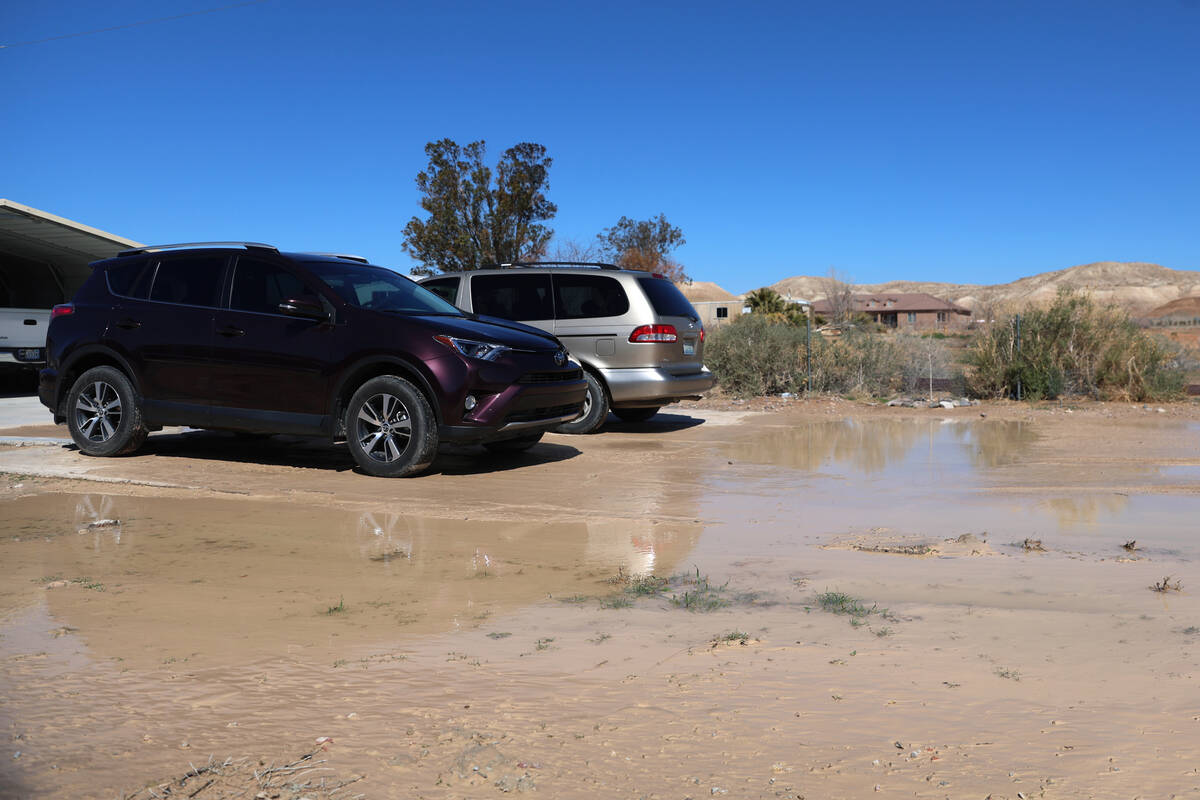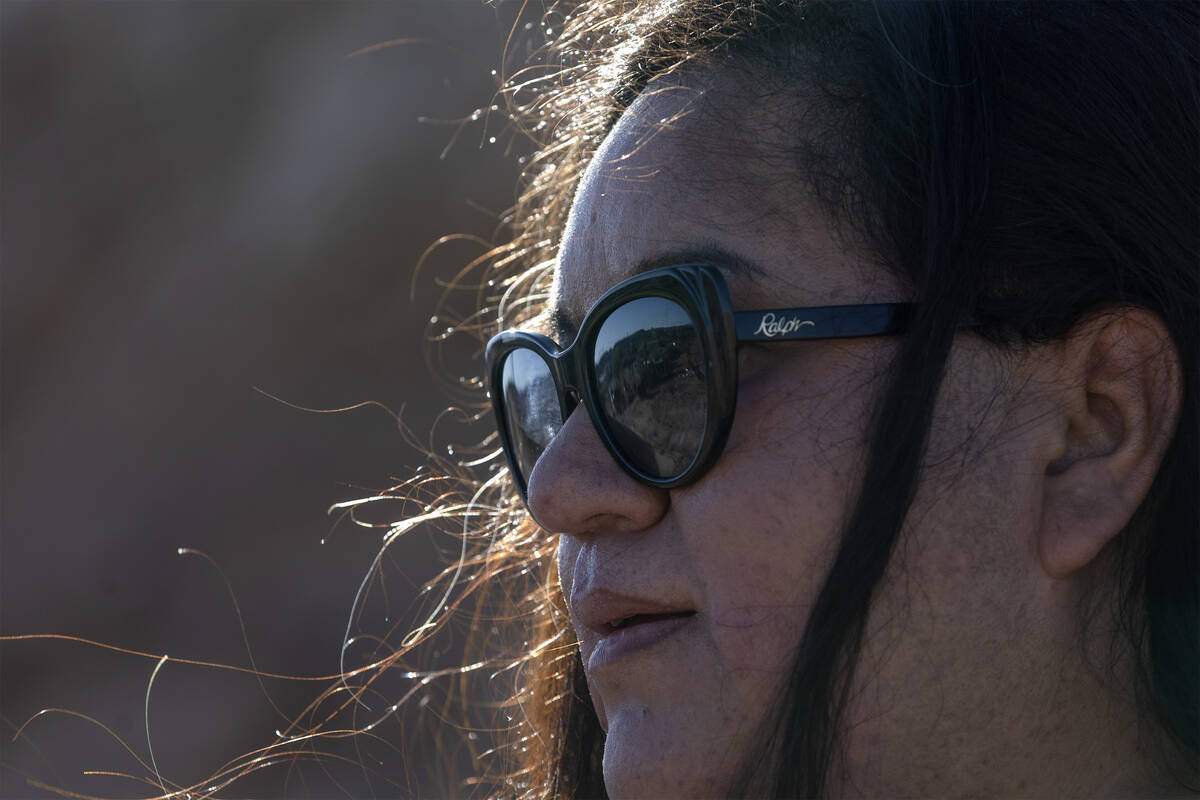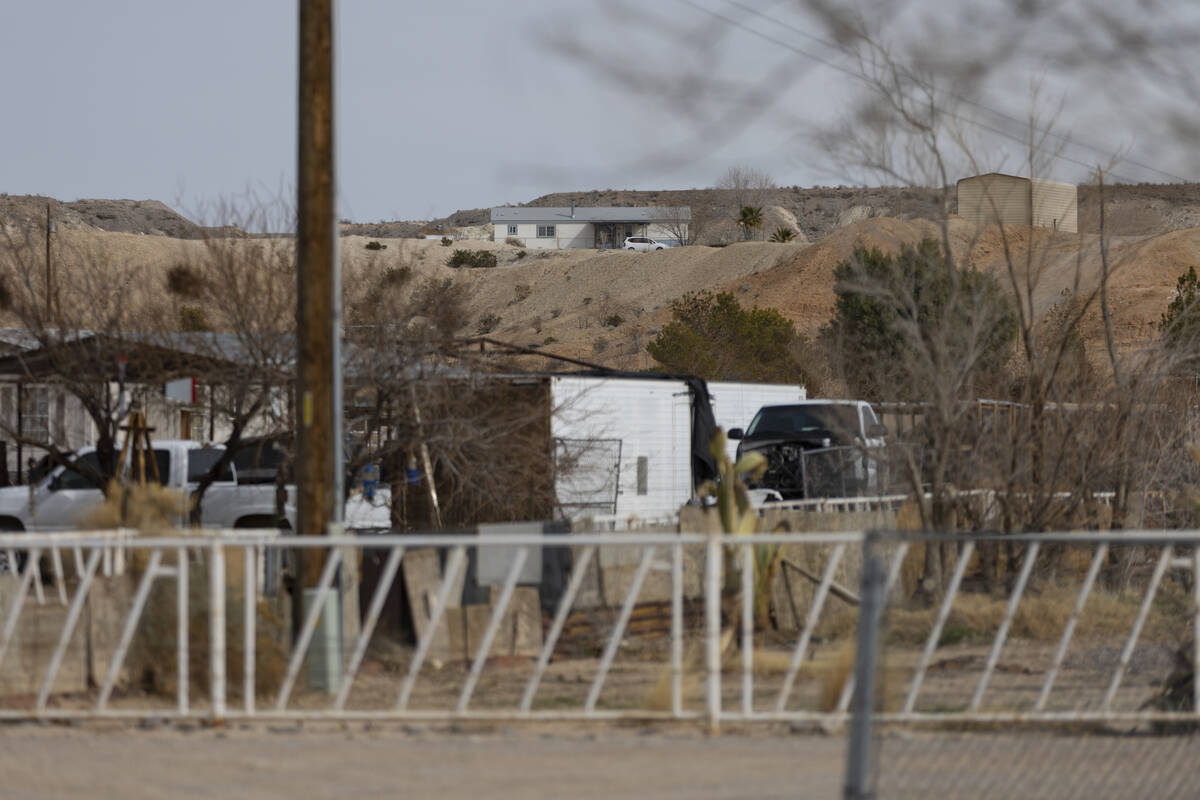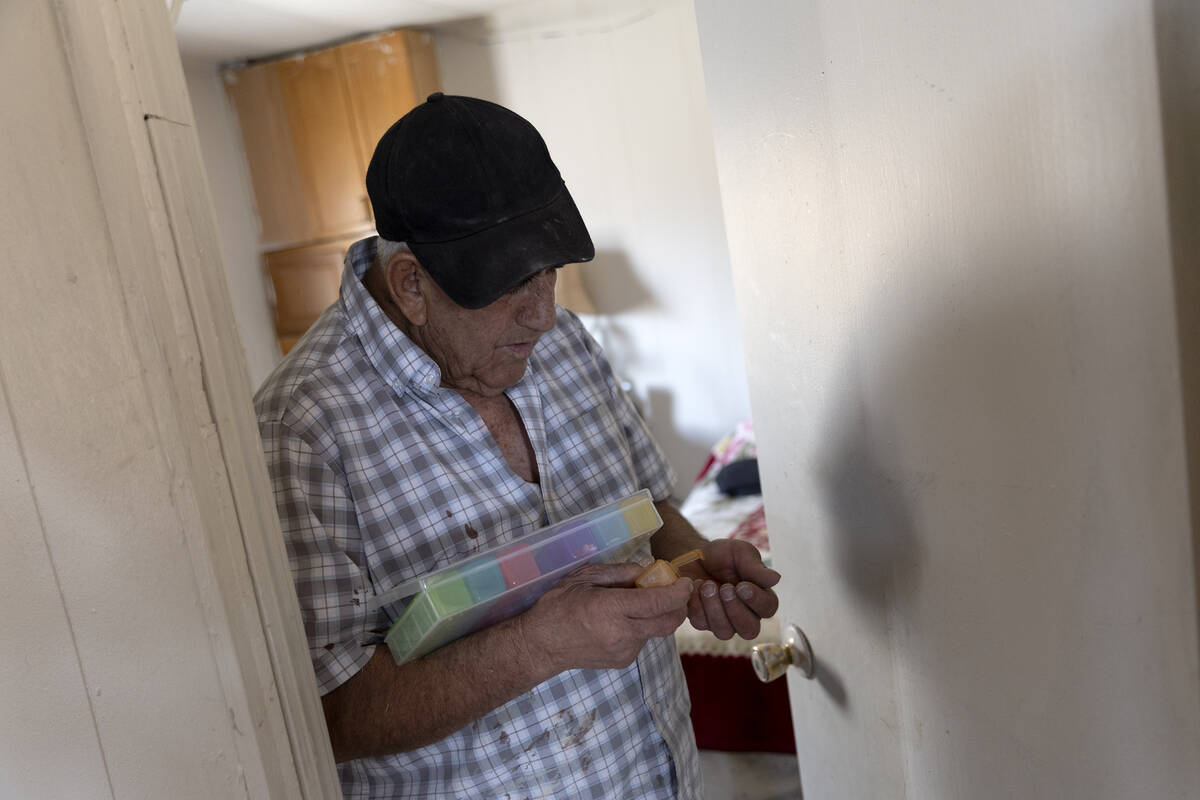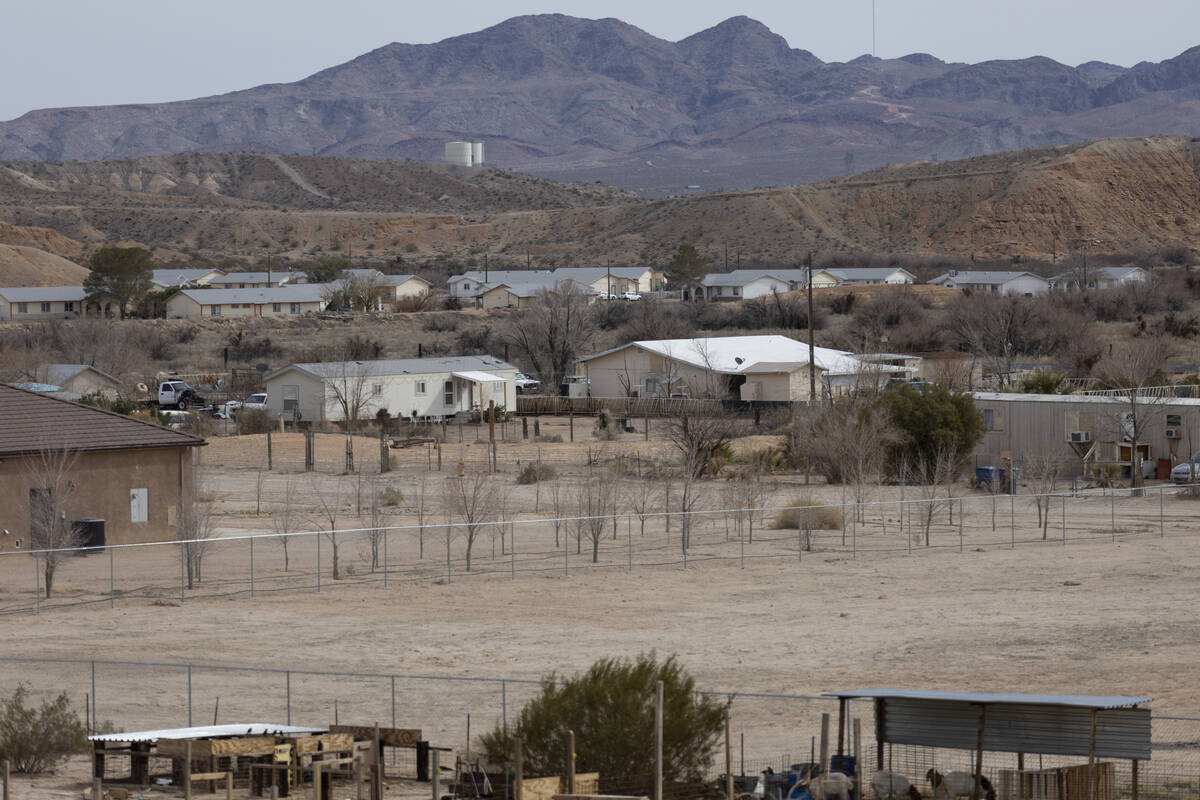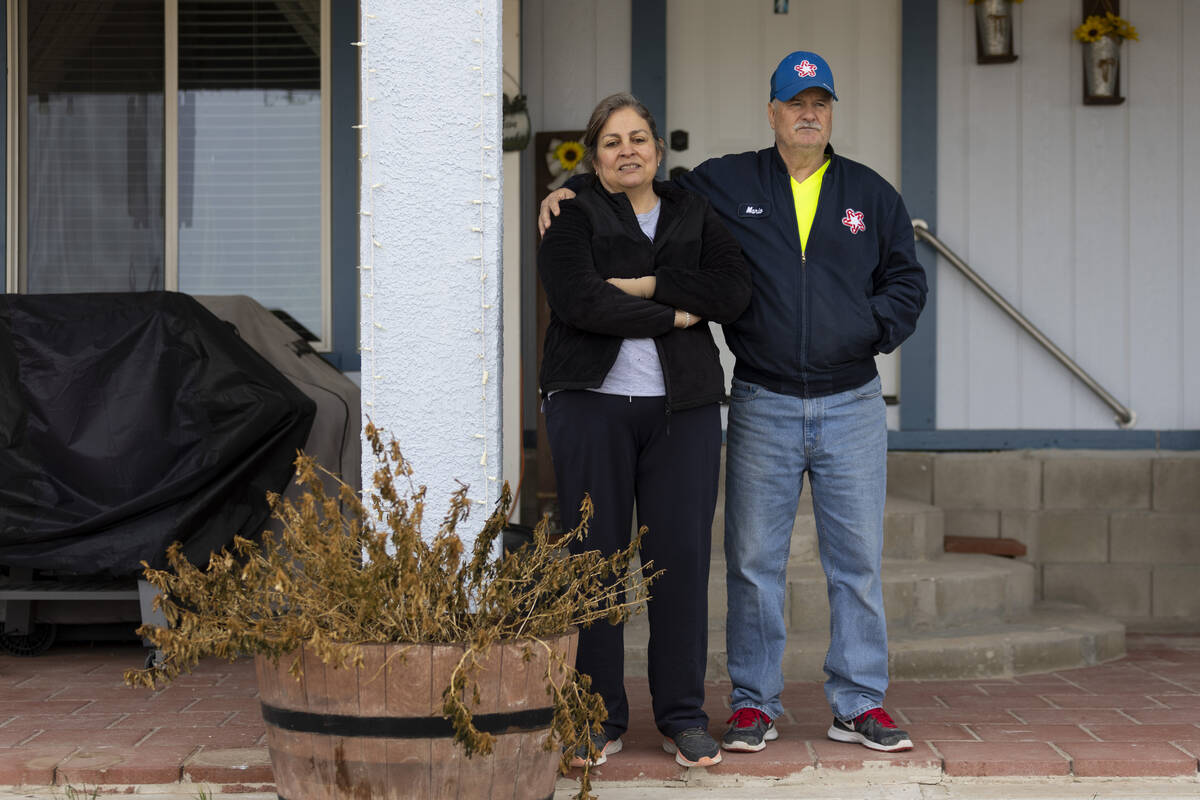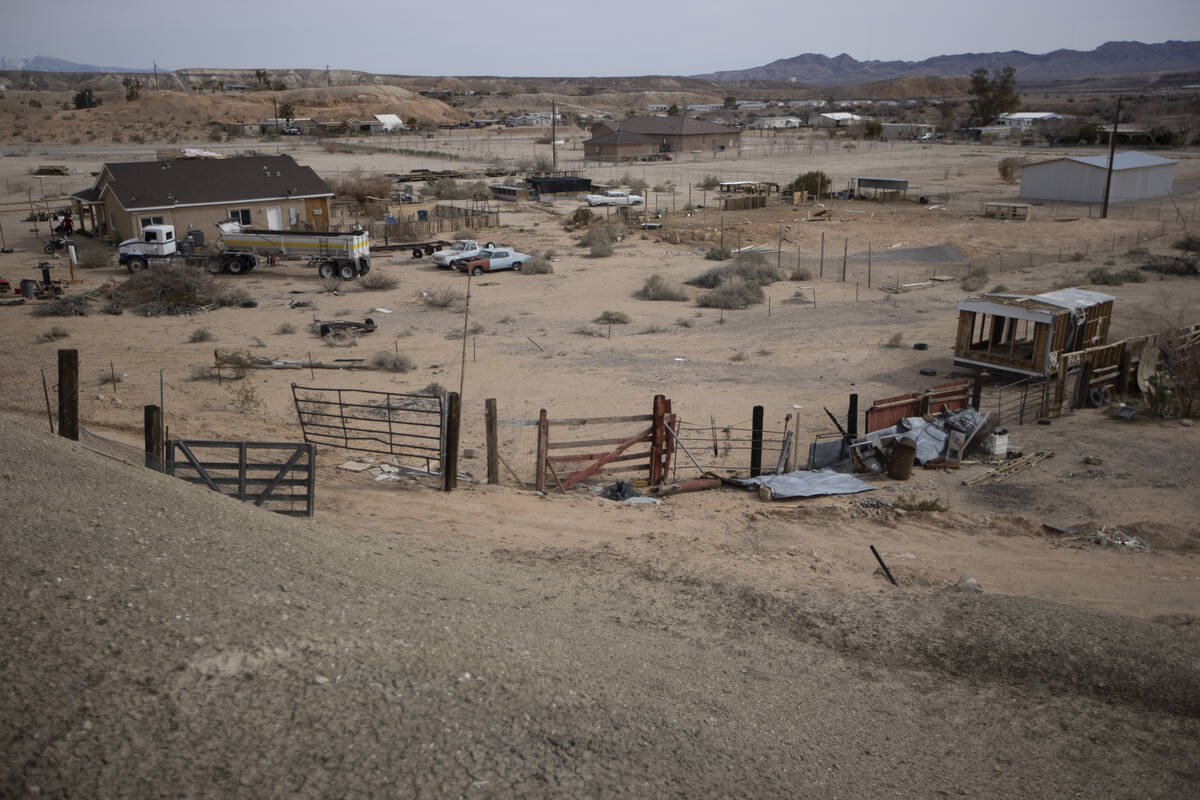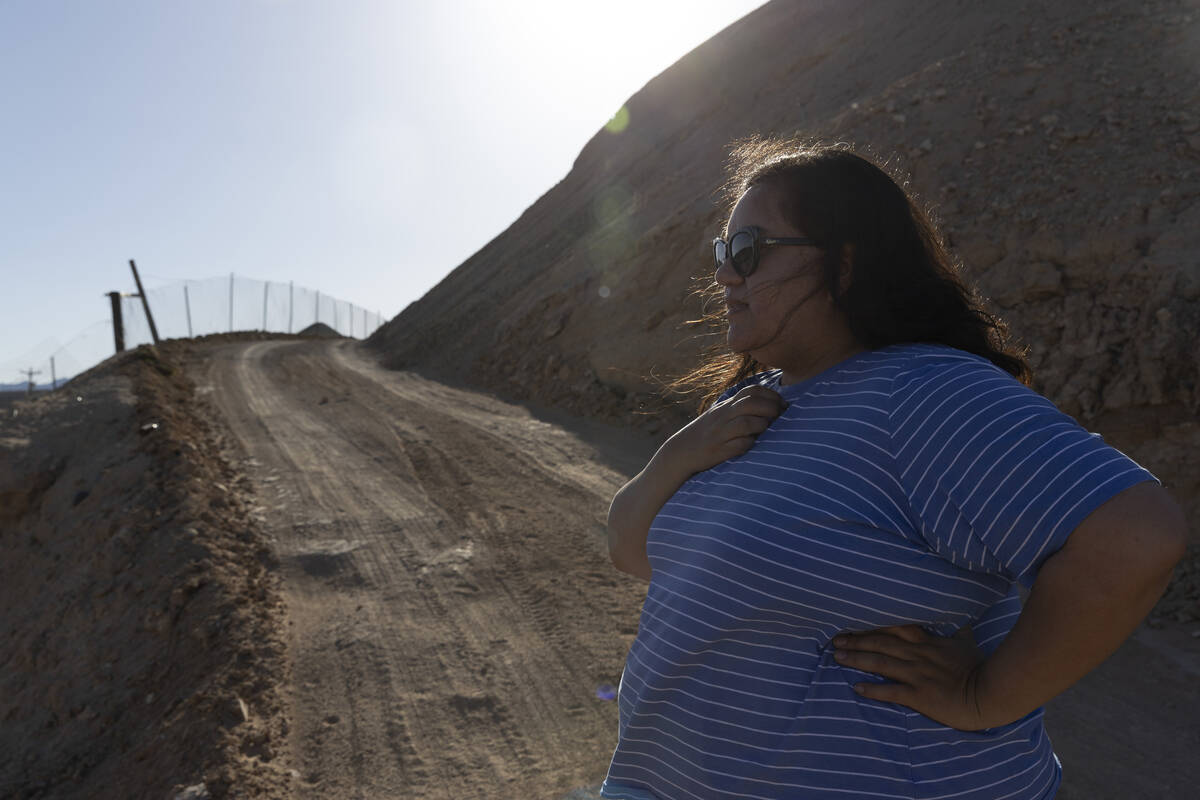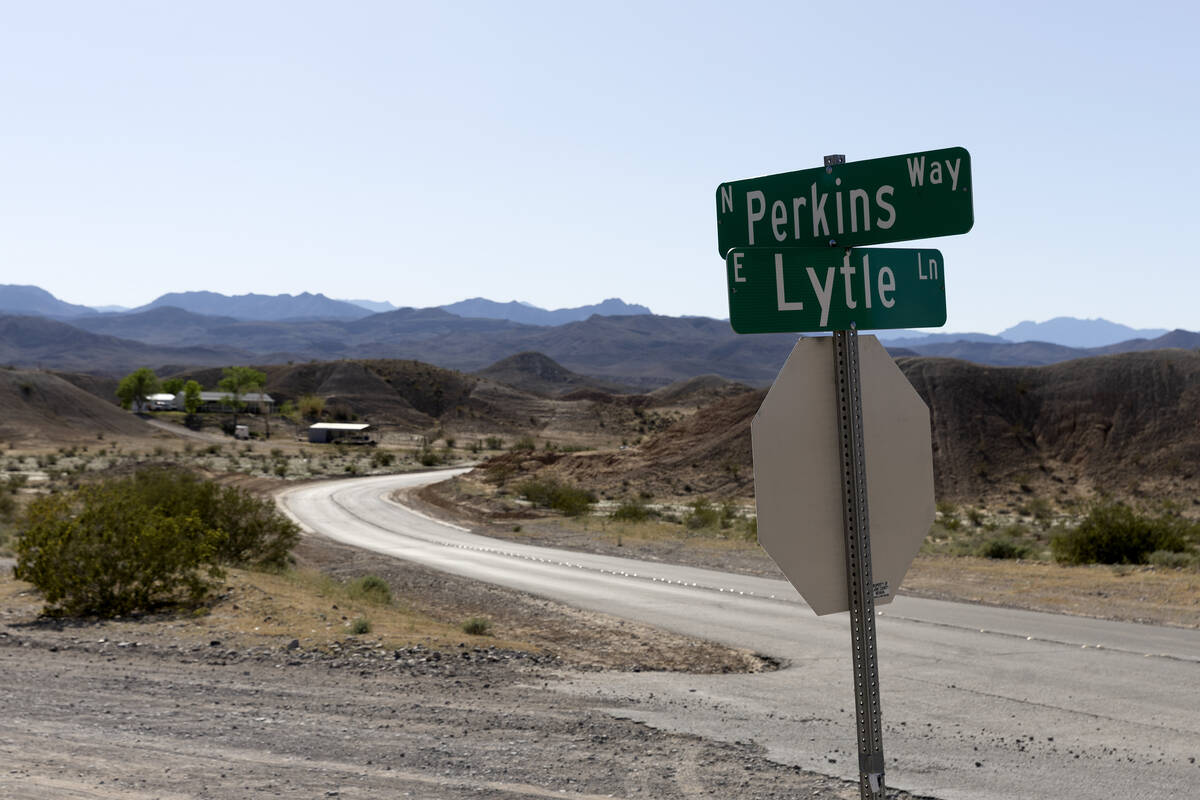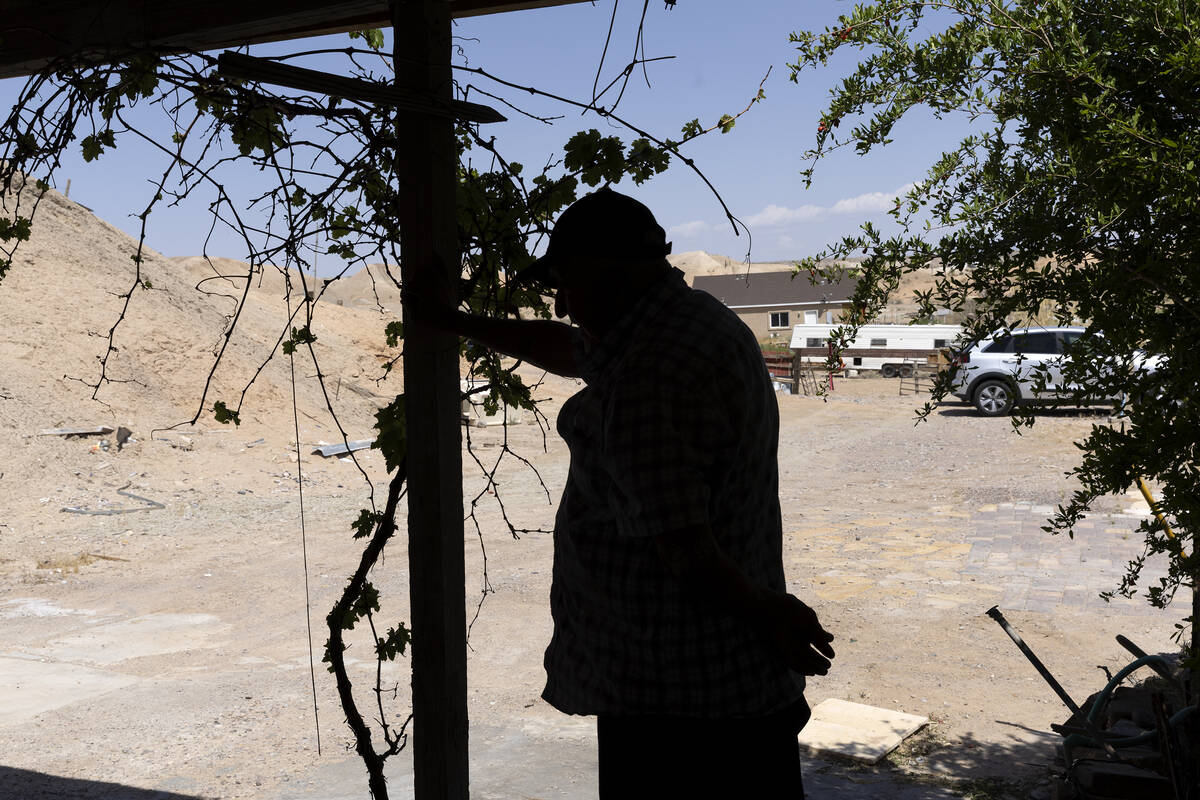In this neighborhood, neglect floods the streets every time it rains
Dark clouds creeping toward suburban Clark County bring hopes of drought-relieving rain to quench the parched desert ground.
But for residents of Lytle Ranch, a rural neighborhood in Moapa Valley, overcast conditions induce dread instead.
That’s because they don’t know if an ordinary downpour in their township will turn unpaved streets in their community into clay capable of trapping their four-wheel drive vehicles, or if a muddy river will thunder through their town, inflicting injuries or preventing emergency services from reaching them.
As it stands, volunteer firefighters have struggled during medical emergencies to find addresses because of the lack of street signs and muddled GPS coordinates even on dry days, residents say.
Alma Perez had to leave her dying father’s side to go search for a lost ambulance crew 16 years ago. She still wonders if they could have saved his life had they arrived earlier, Perez said.
A March 15 storm struck this roughly 40-home, predominantly Mexican-American community particularly hard, evolving into a knee-high, fast-moving river of water that washed away the dirt pathways and stranded residents and their cars.
“It’s a little scary,” Perez said about a month before the flash flood. “I know it doesn’t rain much, but when it rains, when it starts raining, we’ll have years when it rains a lot and it’s a big problem.”
Her husband, Mario Perez, noted that one year the neighborhood flooded four times in five weeks.
“We worry,” resident Pedro Gomez said. “Believe me, we worry.”
‘It’s like a river’
Described as a “tight-knit” and quiet neighborhood, Lytle Ranch is located about five miles down a winding road dotted with hills off Interstate 15, about 60 miles north of Las Vegas. It borders land occupied by the Moapa Band of Paiute Indians of the Moapa River Indian Reservation.
Multi-generational families live in clusters of homes. The workforce has evolved from dairy farming to construction to Republic Services employees.
Residents said they fought for a main road for years until the county paved one about a decade ago. Still, flooding prevents school buses from driving children farther inside the neighborhood, leaving them stranded in the mud. The rain’s aftermath brings neighbors together, whether it’s them checking on each other, freeing stuck cars, or clearing out the dirt roads.
The latest flood transformed the neighborhood into a “little island.”
“It’s just like if we were in the middle of a lake,” Alma Perez said. “It was just flowing, all the ground was covered. If we needed to get out, it’ll be like we would’ve had halfway-up-our-leg water.”
As Clark County crews cleared debris from the neighborhood’s main road — the only one it maintains — Arturo Villezcas described foot-deep waters that damaged his car.
“It’s like a river, this road,” he said. Flooding has mostly spared the homes, which are built on solid, lifted foundations.
Faced with uncertainty about their personal safety, residents, who have alleged decadeslong government neglect, demand that the county pave their streets, establish flood-control infrastructure and at a minimum install street signs.
Delfina Anchondo leads a grassroots effort to bring attention to the neighborhood’s dire needs. She worries that only fate has spared lives in the area.
“It’s terrifying,” she told the Las Vegas Review-Journal in a series of interviews. “I think at this point we’re kind of at the mercy of luck.”
Since 2021, she’s voiced those concerns to local and federal agencies and elected officials. She has lobbied Clark County Commissioner Marilyn Kirkpatrick, who represents the district, more passionately.
Anchondo wonders whether the community’s Latino ethnicity has played into the alleged government inaction. She reasoned that the adjacent white-majority communities, which aren’t immune to flash floods, are better prepared with paved roads and flood control.
‘She’s not the victim’
Earlier this month, Anchondo and her terminally ill father, Oscar Anchondo, finally secured a meeting with Clark County officials. Kirkpatrick acknowledged in an interview later that day that she had offered to erect street signs within 90 days, and survey the community to see if residents wanted to install addresses numbers.
However, it’s the residents’ responsibility to bring their roads up to gravel-grade standard in order for the county to maintain them, and possibly pave them in the future, said Denis Cederburg, the county’s director of public works. The roads in the neighborhood have never been up to standard, he added.
Although flooding has historically been an issue in the area, the water’s intensity has increased in recent years, Kirkpatrick said.
The amount of water, she said, has “made the problem a little bit bigger, quickly.”
Dumping and obstructed washes also exacerbate the problem, Kirkpatrick said. “So, we’re hoping that as a community we can continue to work together to be proactive so that we can let the water run naturally as it has for many, many years.”
Andrew Trelease, assistant general manager for the Clark County Regional Flood Control District, said there were currently no “structural solutions” for flood control in Lytle Ranch, because the houses are deemed safe.
He encouraged residents to keep the washes clean and purchase flood insurance.
“They’re responsible for protecting their own properties,” he said.
Kirkpatrick called infrastructure expensive and said “funding is always the issue.”
Development in the area would help offset costs, something she said Moapa Valley has rejected in the past, she added.
“I’m not saying that they have to grow, but at the same time, when you live in a rural community, there’s expectations of what you get for services,” she said. “We try to stay very close to figuring out what issues are important to them but with infrastructure: growth pays for growth in most cases, or it helps bring that very expensive infrastructure in and we just have to decide if they want to continue to be rural or if they want more of the valley services.”
It’s up to residents to figure out the community’s priorities, and to communicate them to the county through the township’s advisory board, Kirkpatrick said.
Kirkpatrick rejected the notion that she had neglected Lytle Ranch.
“I treat them all the same; they’re all my rural communities,” she said. “I am probably the most boots-on-the-ground person that you’ll meet that’s an elected official, and I take a lot of pride in that.”
And now that she has a specific list of needs from Anchondo, whom Kirkpatrick described as a “great advocate,” the commissioner said the county would work with the community to see where it can help.
Anchondo said Kirkpatrick told her in the meeting that she believed Anchondo had accused the commissioner of racism.
“I told her she’s not the victim here and neither am I,” Anchondo wrote in a text message. “The 40 Mexican families without services and families are.”
‘My father’s daughter’
Anchondo was asked to prepare a presentation for an April town board meeting. When the event was unexpectedly canceled, residents instead showed up to her father’s home.
As afternoon turned into evening, dozens of locals arrived by car or foot, hauling their own lawn chairs for the impromptu community gathering. Dogs barked, roosters crowed, and goats bleated in the distance.
“I am my father’s daughter,” Anchondo declared in English and Spanish.
She then summarized what she’s told officials in a plethora of correspondence, sometimes accompanied by letters signed by the residents.
Anchondo, who worked as a paralegal in rural Wisconsin, told them that 76-year-old Oscar Anchondo, who is cancer stricken and divides his time between Lytle Ranch and her sister’s Las Vegas home, is her main concern.
“I only speak for my father, honestly,” she said in Spanish, “because I don’t have the power to speak for anyone else.”
However, she wanted to “share with you where I’m at right now to see if you guys would support me and what you would support me with if I keep pressing.”
She’s filed complaints with the offices of U.S. Sens. Catherine Cortez Masto and Jacky Rosen, the Nevada attorney general’s office, the Justice Department and the Federal Emergency Management Agency. She’s also contacted the White House, noting President Joe Biden’s administration had earmarked dollars for infrastructure and signed an executive order to address environmental justice.
Anchondo has inquired about contracting an engineering firm to review the law, and to check to see if the roads are passable and up to codes. She’s sought legal aid from firms to explore civil rights litigation.
While she waits to hear back from the Mexican-American Legal Defense and Education Fund nonprofit, the League of United Latin American Citizens has thrown its support toward Lytle Ranch’s “plight.”
“These families live in constant danger due to the lack of adequate protection against flash flooding caused by the absence of paved roads and flood control improvements,” wrote Euler Torres, the civil rights organization’s vice president for the Far West region, in a Cinco de Mayo newsletter. “LULAC hears their pleas and is committed to acting so local authorities address this issue promptly and ensure the safety of these vulnerable families.”
Several neighbors spoke up during the meeting.
“Tienen que hacer algo, senorita,” a man told Anchondo in Spanish. “They have to do something, ma’am.”
“We pay taxes, too,” another man interjected.
A woman said a neighboring family had recently moved away.
”There are no services, or anything,” she said in Spanish.
Anchondo told the locals that she understands if they have doubts about pursuing action, but that they’re not asking for services other Clark County communities don’t have.
“Our only option at this point is to just speak up for ourselves,” she said. “I don’t think anyone is going to help us, we have to be the ones that are demanding things, and I don’t think we should be shy about it.”
“I just don’t want to just accept that nothing can be done, because my father doesn’t want to leave, and he might not be around long enough, but he would love to leave us this property,” she added.
Daughters’ love
On a recent afternoon, Oscar Anchondo swept construction debris from his property.
The Chihuahua, Mexico, native reflected on his strenuous life. He started working at age 5, selling gum and burritos until he got a job at military barracks.
He became a soldier as a teenager, and patrolled the sierras and ranches until violence within the ranks forced him to migrate across the border, he said in his gruff voice.
Anchondo arrived in Southern Nevada 1981, met the mother of his three daughters, wed and eventually bought property at Lytle Ranch for $28,000. For a while they kept farm animals, but rising costs and flooding ended that.
He vowed to fulfill his dying wife’s wishes to look after their girls.
“I don’t know why they love me so much,” said Anchondo in Spanish, explaining that he feels like he didn’t contribute enough to their development into professional women, but that they grew up to be good daughters.
Anchondo wants to live out his last days at his property, something his daughters adamantly oppose. He said he cherishes his independence, and enjoys the peaceful quiet of Lytle Ranch — it reminds him of his own father’s final years.
“I never stop working here,” he said. He’s made futile attempts to install his own flood control.
But at least twice, when the man has fallen ill, he’s had to drive himself to Las Vegas hospitals after ambulances did not arrive, Delfina Anchondo said. Heavy rain tends to knock out telephone and internet services, making it impossible to secure telehealth services, she added.
“Se pone bien feo,” he said. “It gets very ugly.”
Oscar Anchondo dreams for his daughters to inherit his house, and move back to the town that saw them grow.
He said that while money goes away, the property will always be there, and maybe some day, it’ll gain substantial value.
“The house serves them better than it serves me,” he said.
While he still feels healthy, he said he’s fortunate to have lived to old age.
“There’s no use fearing death, it has to arrive some day,” he said. “We have to face it, be prepared for it.”
Contact Ricardo Torres-Cortez at rtorres@reviewjournal.com. Follow @rickytwrites on Twitter.



